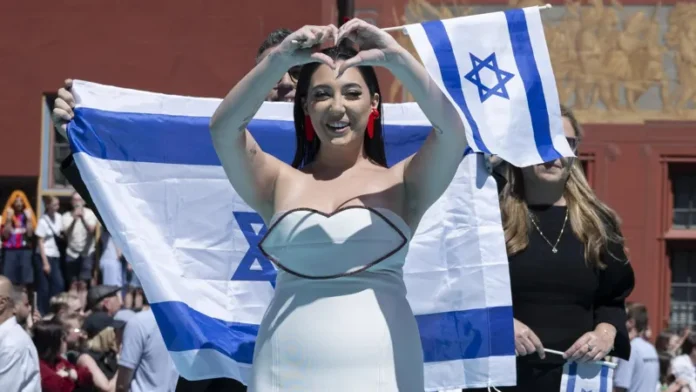Yuval Raphael never imagined she would one day take the stage at Eurovision. Just over a year ago, the Israeli singer faced a horrific ordeal that nearly cost her life.
Now, against all odds, she is preparing to perform at the world’s largest music event, showcasing not only her resilience but also the power of music to heal.
On October 7, 2023, Raphael attended the Nova festival in Israel, where she was nearly killed when Hamas gunmen attacked the crowd.
As rockets fired from Gaza and gunmen opened fire on festivalgoers, Raphael and her friends sought refuge in a nearby bomb shelter. However, their safety was short-lived as the attackers shot into the shelter and threw hand grenades inside.
Trapped and unable to escape, Raphael spent hours hiding under the bodies of the dead, clutching her phone and calling her father in desperation.
In a chilling recording played in an Israeli documentary, she begged her father for help, believing she was about to die. “Bye,” she said, unsure if she would survive.
Miraculously, Raphael was one of only 11 survivors from the shelter. She survived by playing dead and lying under the pile of bodies for eight hours until rescue teams arrived.
The attack left over 1,200 people dead, with 251 taken hostage. In the aftermath, Raphael’s life took an unexpected turn.
“I wished for myself to be happy and to really understand the gift that I had been given,” she shared in an interview. “To live fully and experience more.”
Since then, Raphael has channeled her pain into music, with her career taking off after the traumatic event. On Thursday, she will perform her song, New Day Will Rise, at the Eurovision semi-final with shrapnel still lodged in her leg.
Despite the personal toll, she views her performance as a symbol of resilience and a “personal win.” “It feels like a personal win, just to be having this experience and representing my country and doing it with such pride,” she said.
However, Raphael’s participation in Eurovision has not been without controversy. The ongoing conflict in the Middle East has sparked protests from some broadcasters and former Eurovision contestants who have called for Israel’s exclusion from the competition.
The Irish national broadcaster RTÉ, along with Spain and Slovenia, expressed their concerns over Israel’s participation. Over 70 former Eurovision contestants also signed a letter urging the European Broadcasting Union (EBU) to ban Israel from the event.
Despite these challenges, Raphael remains focused on her performance. “We are here to sing,” she said, acknowledging that she expected some booing.
“Everybody has opinions,” she added, emphasizing that her focus is on the music and the theme of this year’s event: “united by music.”
Eurovision organizers have stated that while they understand the concerns surrounding the situation in the Middle East, the competition must remain a “universal event that promotes connections, diversity, and inclusion.”
As Raphael takes to the stage, she carries with her the weight of her traumatic past, yet her message is one of hope, love, and resilience. For her, Eurovision is more than just a performance—it’s a platform to heal and to share her story with the world.

